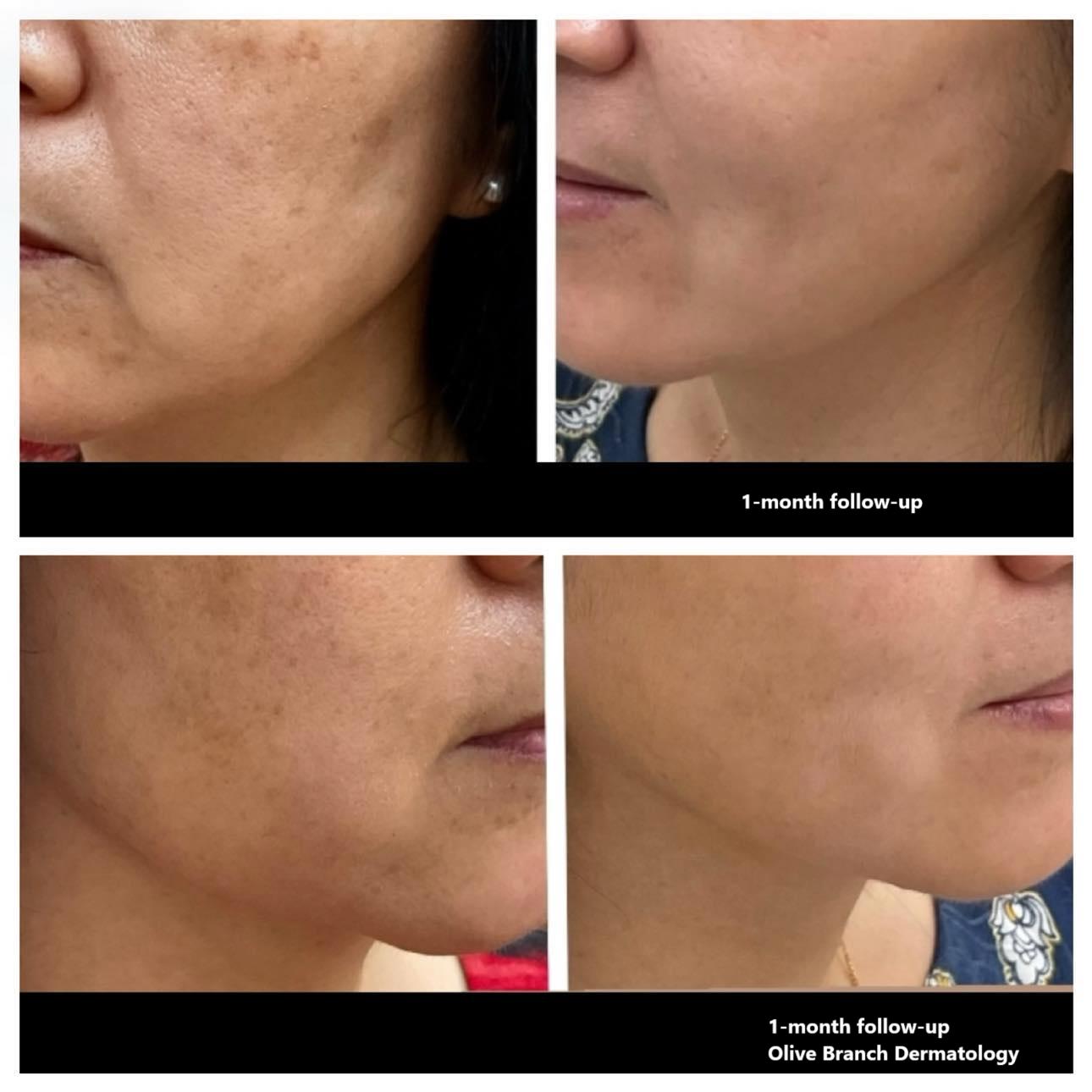Melasma
Melasma is a common skin condition characterized by the appearance of dark, discolored patches on the skin, primarily on the face. Often referred to as "the mask of pregnancy," melasma typically affects women, particularly during hormonal changes such as pregnancy or the use of hormonal contraceptives. However, it can also occur in men and is influenced by various factors, including sun exposure, genetics, and certain medications.
At Olive Branch Dermatology, Dr. Alkeswani specializes in diagnosing and treating melasma. The condition usually manifests as symmetrical brown or gray-brown patches on the cheeks, forehead, nose, and upper lip, leading to self-consciousness for many individuals.

The exact cause of melasma remains unknown, but several contributing factors have been identified, including sun exposure, genetics, and hormonal changes. Melasma occurs when melanocytes, the cells responsible for producing melanin, become overstimulated, leading to dark, blotchy patches on the skin, typically on the forehead, upper lip, and cheeks. While melasma predominantly affects women, men can also develop the condition, with approximately 10% of cases occurring in males.
Individuals with light to medium brown skin (Fitzpatrick skin types III and IV) and darker skin (Fitzpatrick skin types V and VI) are more prone to melasma due to a higher concentration of melanocytes. A family history of melasma or hyperpigmentation further increases the likelihood of developing this skin condition.
Sun exposure is the most significant trigger for melasma. Ultraviolet (UV) rays stimulate melanocyte activity, making sun protection essential. Wearing broad-spectrum sunscreen with SPF 50 or higher daily can help prevent further darkening and recurrence of melasma after treatment.
Hormonal fluctuations, particularly increased levels of estrogen and progesterone, are also linked to melasma. Factors such as pregnancy, oral contraceptives, and hormone replacement therapy can exacerbate the condition. Dr. Alkeswani may recommend discontinuing oral contraceptives for patients experiencing melasma to improve their skin's appearance.
Additionally, there is a connection between melasma and thyroid disease, with some studies indicating that patients with melasma often have elevated thyroid antibodies. The frequency of thyroid disease is significantly higher in individuals with melasma compared to the general population.
Hormonal changes, particularly fluctuations in the female hormones estrogen and progesterone, have been associated with the development of melasma. Oral contraceptives, which commonly contain these hormones to prevent pregnancy, may also contribute to melasma. Elevated levels of estrogen and progesterone can increase the number of melanocytes—the skin cells responsible for producing melanin—making the skin more sensitive to ultraviolet (UV) rays.
Discontinuing oral contraceptives may help lighten existing melasma and improve your complexion. Non-hormonal methods of birth control are generally less likely to trigger melasma. It’s crucial to use sunscreen while on hormonal contraceptives, as these medications can heighten sensitivity to sunlight and worsen pigmentation.
During your consultation with Dr. Alkeswani, she will conduct a thorough evaluation of your medical and family history, along with a physical examination of your skin condition. Based on her assessment, she may recommend specific laboratory tests to investigate hormonal changes that could be linked to your melasma. If necessary, Dr. Alkeswani may collaborate with your gynecologist to mitigate the impact of oral contraceptives on your melasma.
Melasma can sometimes fade on its own, depending on its underlying causes. Generally, it improves when you completely avoid sun exposure. However, many cases require cosmetic intervention, which may include a customized skincare regimen, in-office treatments, or a combination of both. Melasma is a complex skin condition influenced by various factors such as genetics, hormonal changes, and sun exposure. Pregnant women may develop melasma due to hormonal fluctuations, but it often resolves after pregnancy, especially with consistent sun protection.
In cases where melasma is linked to hormonal birth control, its appearance may diminish once the individual stops the medication. For most patients, a targeted treatment plan is crucial to effectively reduce the appearance of melasma. An experienced board-certified dermatologist like Dr. Alkeswani at Olive Branch Dermatology can work with you to create a personalized treatment strategy tailored to your skin type, needs, and aesthetic goals.
- Topical Treatments
Topical treatments are often the first line of defense against melasma and can be categorized into over-the-counter (OTC) and prescription (Rx) options.
OTC Treatments:
- Kojic Acid: A natural compound derived from fungi that inhibits melanin production and is commonly found in over-the-counter products.
- Vitamin C: A powerful antioxidant that brightens skin and reduces the appearance of melasma.
- Niacinamide: Known for its anti-inflammatory properties, niacinamide can help brighten skin and improve overall tone.
- Licorice Extract: Contains glabridin, which helps to lighten hyperpigmentation and soothe skin.
- Arbutin: A naturally occurring compound that inhibits melanin production and can lighten dark spots.
- Alpha Hydroxy Acids (AHAs): Ingredients like glycolic acid and lactic acid promote exfoliation, helping to reduce pigmentation.
Prescription Treatments:
- Hydroquinone: This cream lightens dark patches by inhibiting melanin production and is one of the most commonly used treatments for melasma.
- Tretinoin: A topical retinoid that promotes cell turnover and enhances the effectiveness of other treatments when used in combination.
- Azelaic Acid: Known for its anti-inflammatory and antibacterial properties, azelaic acid also helps lighten hyperpigmentation.
2. Chemical Peels
Dr. Alkeswani expertly customizes chemical peels, including the VI Peel line, to target melasma effectively. These peels use various acids to exfoliate the skin's surface and promote the removal of pigmented layers.
3. Laser Treatments
Laser therapy is an advanced option for treating melasma. Dr. Alkeswani utilizes fractional laser technology to push active ingredients like tranexamic acid deeper into the skin, enhancing their effectiveness in lightening discolored patches.
4. Microneedling
Microneedling involves using fine needles to create micro-injuries in the skin, promoting collagen production and enhancing the absorption of topical treatments.
5. Sun Protection
Daily sun protection is critical for managing melasma. Dr. Alkeswani recommends mineral tinted sunscreens with SPF 50 or higher. Additionally, incorporating supplements like Heliocare or Inner Glow Sol Defense vitamins can help boost sun protection.
6. Hormonal Management
Since hormonal fluctuations can trigger melasma, it's important to discuss any hormonal medications with your dermatologist. For some patients, switching to a non-hormonal method of birth control may help improve melasma.
7. Lifestyle Modifications
In addition to medical treatments, lifestyle changes can support skin health and reduce melasma flare-ups:
- Healthy Diet: A balanced diet rich in antioxidants promotes overall skin health.
- Avoiding Heat: Excessive heat, such as from saunas or hot showers, can aggravate melasma.
- Gentle Skin Care: Use mild, non-irritating products to avoid exacerbating pigmentation.
If you’re struggling with melasma, effective treatment options are available to help you regain clear, radiant skin. Consulting with a board-certified dermatologist like Dr. Alkeswani at Olive Branch Dermatology can provide you with a personalized treatment plan tailored to your specific needs.
Don’t let melasma hold you back. With the right combination of treatments and preventive measures, you can achieve a more even skin tone and boost your confidence.

